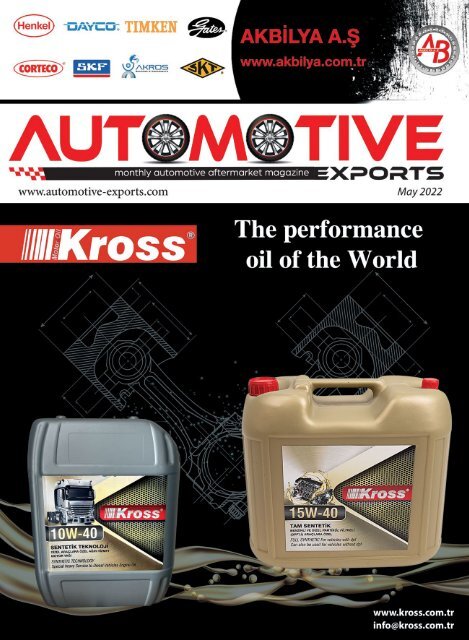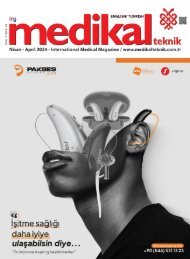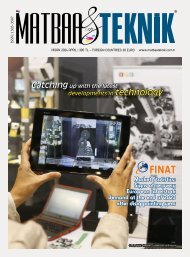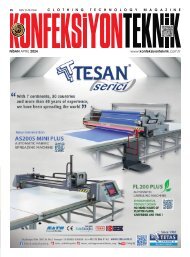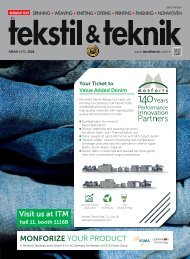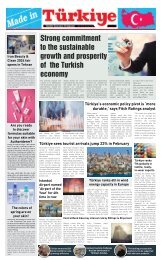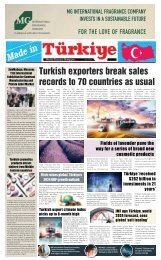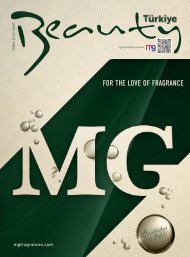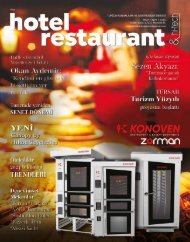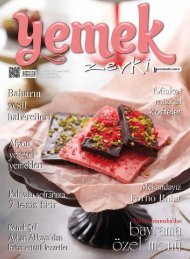You also want an ePaper? Increase the reach of your titles
YUMPU automatically turns print PDFs into web optimized ePapers that Google loves.
1
Monthly automotive aftermarket magazine<br />
GROUP CHAIRMAN<br />
H. FERRUH ISIK<br />
PUBLISHER:<br />
İstmag Magazin Gazetecilik<br />
İç ve Dış Ticaret Ltd. Şti.<br />
Managing Editor (Responsible)<br />
Mehmet Söztutan<br />
mehmet.soztutan@img.com.tr<br />
Editor<br />
Ali Erdem<br />
ali.erdem@img.com.tr<br />
EDİToR<br />
Mehmet Soztutan, Editor-in-Chief<br />
mehmet.soztutan@img.com.tr<br />
Advertising Managers<br />
Adem Saçın<br />
+90 505 577 36 42<br />
adem.sacin@img.com.tr<br />
Enes Karadayı<br />
enes.karadayi@img.com.tr<br />
International Marketing Coordinator<br />
Ayca Sarioglu<br />
ayca.sarioglu@img.com.tr<br />
Editor<br />
Yusuf Okçu<br />
yusuf.okcu@img.com.tr<br />
Finance Manager<br />
Cuma Karaman<br />
cuma.karaman@img.com.tr<br />
Digital Assets Manager<br />
Emre Yener<br />
emre.yener@img.com.tr<br />
Technical Manager<br />
Tayfun Aydın<br />
tayfun.aydin@img.com.tr<br />
Design & Graphics<br />
Sami aktaş<br />
sami.aktas@img.com.tr<br />
Accountant<br />
Yusuf Demirkazık<br />
yusuf.demirkazik@img.com.tr<br />
Subsciption<br />
İsmail Özçelik<br />
ismail.ozcelik@img.com.tr<br />
HEAD OFFICE:<br />
İstmag Magazin Gazetecilik<br />
İç ve Dış Ticaret Ltd. Şti.<br />
Ihlas Media Center<br />
Merkez Mah. 29 Ekim Caddesi No: 11B / 21<br />
Yenibosna Bahcelievler, Istanbul / TURKEY<br />
Tel: +90 212 454 22 22<br />
www.img.com.tr sales@img.com.tr<br />
KONYA:<br />
Metin Demir<br />
Hazım Uluşahin İş Merkezi C Blok<br />
Kat: 6 No: 603-604-605 KONYA<br />
Tel: (90.332)238 10 71 Fax: (90.332)238 01 74<br />
PRINTED BY:<br />
İHLAS GAZETECİLİK A.Ş.<br />
Merkez Mahallesi 29 Ekim Caddesi İhlas Plaza<br />
No:11 A/41 Yenibosna–Bahçelievler/ İSTANBUL<br />
Tel: 0212 454 30 00<br />
www.ihlasmatbaacilik.com<br />
Export-led growth given impetus<br />
Following a mandatory yet brief break due to the coronavirus outbreak, Turkish factories<br />
located in leading industrial cities of the country, started operating, with new investments<br />
on the way thanks to increasing orders from foreign markets. Besides, the sales of electric<br />
cars, which are expected to replace cars with internal combustion engines in the future,<br />
continued the upward trend of recent years.<br />
<strong>Automotive</strong> exporters operating in Turkey consistently put an emphasis to tackle the<br />
problems they face in integrating an innovation strategy with planning and execution and<br />
moving at speed to stay ahead of the competition.<br />
As known, the Turkish auto parts industry has recorded a dynamic growth in line with the<br />
automotive industry. From simple components in the mid-1960s, the sector has ascended<br />
to produce high-tech components.<br />
The industry with its large capacity, wide variety of production and high standards, supports<br />
automotive industry production and the vehicles in Turkey and also has ample potential for<br />
additional exports.<br />
The leading foreign automotive parts manufacturers have established their presence in the<br />
country through joint-ventures. There has also been substantial locally-owned investments<br />
by spare parts manufacturers.<br />
To sum up:<br />
- Quality of production of the industry improved dramatically, especially through the<br />
establishment of quality management systems.<br />
- The industry has adapted to the EU regulations and has established an efficient and<br />
exemplary cooperation with public institutions in the transformation of the EU regulations<br />
to national regulations.<br />
- <strong>Exports</strong> have risen sharply, and Turkish production has been integrated into manufacturers’<br />
global planning.<br />
-The export potential of the automotive parts sector, coupled with the presence of major<br />
international automotive manufacturers, has attracted an increasing number of foreign<br />
investors.<br />
Key factors which attract foreign capital inflows to Turkey mainly include the market size,<br />
consumer composition, friendly investment legislation and banking system together<br />
with other attractiveness arising from highly skilled human resources in production and<br />
management, the unsaturated domestic market with high potential, easy access to<br />
neighboring (regional) emerging markets, and low labor cost.<br />
We wish them lucrative trade for the business people operating in the automotive business.<br />
automotiveexport<br />
automotiveexports
Punch Powertrain launches<br />
proprietary DCT invention in serial<br />
production<br />
New and patented way of realizing “dual<br />
clutch principle” with a single lay shaft<br />
resulting in world’s most compact DCT; light<br />
weight and cost effective design rendering<br />
to be more sustainable technology and<br />
affordable for compact car segment<br />
• Tata Motors is the pioneer to introduce<br />
this technology as part of its premium<br />
hatchback Altroz DCA, representing the<br />
“Gold Standard” in automatics in its<br />
segment<br />
• The Altroz DCA launch marks a milestone<br />
in company’s transformation towards DCT,<br />
soon launching hybridized and higher<br />
torque variants on road to affordable<br />
sustainability and electrification<br />
Punch Powertrain launches its innovative<br />
DCT system with a revolutionary, more<br />
compact and affordable design. The DT1<br />
has been launched in India, debuting in the<br />
recent launch Altroz DCA by Tata Motors.<br />
This ingenious design guarantees that DT1<br />
offers reliable performance and improved<br />
driving comfort even under the most<br />
challenging conditions, such as extreme<br />
ambient temperatures, high altitudes, and<br />
challenging driving environment, such as<br />
uneven roads and stop-and-go driving.<br />
Punch Powertrain’s unique and patented<br />
new way of realizing the dual clutch<br />
principle offers seamless comfortable<br />
DCT shifting, while using 35% less shifting<br />
components. In this unique design one of<br />
the two clutches represents an additional<br />
planetary gearset ratio that can be engaged<br />
between the engine and the transmission.<br />
This allows the unit to shift seamlessly<br />
up-to 7 forward ratios*, using only 4 gear<br />
pairs and only one layshaft. This results in<br />
a lighter, more compact powertrain, while<br />
offering a considerable cost reduction.<br />
Through application of a wet-clutch<br />
design, the transmission offers excellent<br />
continued performance on inclines and<br />
in stop-and-go-traffic. This aligns with<br />
Punch Powertrain’s vision to provide<br />
performant products at lower cost, or<br />
offer more functionality and performance<br />
at cost parity with competition. Thanks to<br />
its compactness and design features, the<br />
DT1 enables car manufacturers to offer<br />
additional benefits to drivers, unique to its<br />
segment and vehicle price range.<br />
The DT1 is fitted with machine learning<br />
software that optimizes transmission<br />
behavior, based on its diagnostics and<br />
analysis of thousands of parameters at the<br />
speed of 100 times per second. The shift<br />
by wire ensures smooth shifting, while<br />
the software offers the additional benefit<br />
of automatic missing driver detection and<br />
activation of the park lock mechanism.<br />
Another asset is the self-healing technology<br />
that prevents the build-up of dust or debris<br />
through an automatic vibration system,<br />
decreasing the need of active maintenance.<br />
Because of the extensive in-house software<br />
expertise, Punch Powertrain is able to offer<br />
the most complete and smart solutions<br />
that combine robustness and comfort at no<br />
or limited extra costs.<br />
The DT1 smart design strongly resonates<br />
with Tata Motors’ constant efforts to offer<br />
‘The Gold Standard’ in its Altroz line.<br />
While the invention was created and<br />
developed in the company’s R&D centers in<br />
the Netherlands and Belgium, the company<br />
will localize production and is establishing<br />
a solid support base for its local customer<br />
in India. This is in line with the company’s<br />
‘local for local’ strategy, ensuring short<br />
communication lines and agility towards<br />
the local markets of its global customers.<br />
The launch of its DCT technology in India<br />
signifies the entry into a new market for<br />
the company, largely widening its reach<br />
and potential, while further potential<br />
markets are investigated.<br />
In addition to entering a new market,<br />
the DT1 signifies the first DCT in serial<br />
production for Punch Powertrain, helping<br />
car manufacturers meet the increasingly<br />
tightening CAFE norms for smaller vehicles.<br />
The compact design of this DCT and over<br />
10 years of in-house expertise in the<br />
development of e-motors render the<br />
electrification a natural next step in its<br />
transition to electrified and fully electric<br />
propulsion systems. Within its expanding<br />
product range, the company will launch a<br />
higher torque hybrid DCT variant – DT2 –<br />
later this year for mid-segment vehicles on<br />
European and global markets, rendering<br />
the company the leading hybrid DCT<br />
supplier worldwide as of 2024.<br />
With its inventor legacy in CVT technology,<br />
the new DCT marks the company’s<br />
transformation towards new technologies<br />
as part of its sustainable solutions offering,<br />
such as hybrid and electric propulsion<br />
systems.<br />
*OEM is free to use up-to 7 gears to make<br />
it a best fit with their application objective.<br />
<strong>May</strong> <strong>2022</strong> 8
Mercedes profits rise on higher prices<br />
German automaker Mercedes-Benz said<br />
that higher sales prices enabled it to lift<br />
its bottom line slightly in the first three<br />
months of the year, despite a shortage of<br />
semiconductors and fallout from the war in<br />
Ukraine.<br />
Mercedes-Benz said in a statement that<br />
it booked net profit of 3.6 billion euros<br />
($3.8 billion) in the period from January to<br />
March, an increase of three percent over<br />
the same period last year.<br />
Underlying or operating profit rose by 11<br />
percent to 5.2 billion euros on a six-percent<br />
increase in revenues to 35 billion euros.<br />
The Stuttgart-based carmaker said its<br />
results were boosted by a “sharpened<br />
focus on top-end vehicles and premium<br />
vans, combined with ongoing cost<br />
discipline... even as the Covid-19 pandemic,<br />
semiconductor supply-chain bottlenecks<br />
and war in Ukraine continued to impact<br />
business.”<br />
Mercedes-Benz said unit sales of its cars<br />
were down by 10 percent at around<br />
487,000.<br />
Over the past year, automakers have been<br />
battling shortages in semiconductors,<br />
electronic components that are used in<br />
both conventional and electric vehicles,<br />
occasionally being made to halt production.<br />
The war in Ukraine has similarly aggravated<br />
the supply-chain disruptions faced by<br />
manufacturers.<br />
Like rivals BMW and Volkswagen,<br />
Mercedes-Benz stopped exports to Russia<br />
and closed production sites in the country,<br />
leading to related expenses of 709 million<br />
euros in the first quarter.<br />
Looking ahead, Mercedes-Benz said the<br />
outlook was clouded by “exceptional<br />
degree of uncertainty,” particularly the<br />
impact of the war on “supply chains,<br />
and the development of prices for raw<br />
materials and energy.”<br />
Mercedes said it expected shortages,<br />
including of semiconductors, “to impact<br />
business for the remainder<br />
of <strong>2022</strong>.”<br />
<strong>May</strong> <strong>2022</strong> 10
Lotus Eletre - the world’s first<br />
hyper-SUV EV - is revealed in London<br />
Coming to Life – the Lotus Eletre – the<br />
world’s first electric hyper-SUV has been<br />
launched in London. On Tuesday 29 March<br />
the car made its global debut in front of<br />
a live audience of several hundred VIP<br />
guests, viewing action inside and outside<br />
the world-famous BBC Television Centre in<br />
west London.<br />
The Eletre is an all-new and all-electric<br />
hyper-SUV, a striking and progressive<br />
addition to the Lotus range, and the first of<br />
a new breed of pure electric SUVs. It takes<br />
the core principles and Lotus DNA from<br />
more than 70 years of sports car design<br />
and engineering, evolving them into a<br />
desirable all-new lifestyle car for the next<br />
generation of Lotus customers.<br />
Guests at the ‘Carved by Air’ event<br />
included F1 world champion and Lotus<br />
customer Jenson Button, who was behind<br />
the wheel of the Eletre as it debuted on<br />
stage from behind a huge TV screen. Also<br />
present were famous faces from the world<br />
of motoring and from the global Lotus<br />
community, including members of the<br />
Chapman family and Elisa Artioli, after<br />
whom the Lotus Elise was named.<br />
Highlights included a parade of Lotus cars<br />
past and present, followed by a five-minute<br />
live-action telling of ‘The Story of Lotus’.<br />
It was all shot in one continuous take,<br />
making full use of the iconic circular Helios<br />
courtyard at the heart of the BBC Studios.<br />
It featured a cast of actors portraying<br />
everyone from Lotus founders Colin and<br />
Hazel Chapman to legendary racing drivers<br />
Jim Clark and Emerson Fittipaldi.<br />
Inside, seated guests were treated to a<br />
stunning aerial ballet and the on-stage<br />
debut of the Lotus Eletre. A bold new<br />
dimension to the Lotus performance car<br />
portfolio, the Eletre delivers a significant<br />
number of firsts for Lotus – the first fivedoor<br />
production car, the first model outside<br />
sports car segments, the first lifestyle EV,<br />
the most ‘connected’ Lotus ever. And yet<br />
it remains a true Lotus, a beautiful car<br />
‘carved by air’, packed with pioneering<br />
technology, genuine sporting performance<br />
and simplicity of purpose, designed and<br />
developed by a passionate and global<br />
team.<br />
The hour-long show was hosted by TV<br />
presenters Andy Jaye and Julia Hardy, and<br />
livestreamed to legions of fans around<br />
the world. Numerous retail partners in<br />
all corners of the globe hosted customer<br />
events in their showrooms to watch live.<br />
Matt Windle, Managing Director, Lotus<br />
Cars, commented: “London is the<br />
birthplace of Lotus and to take over the<br />
iconic BBC Studios, inside and out, to<br />
launch the Lotus Eletre to the world, is<br />
fantastic. The Eletre is a hugely significant<br />
moment in our ongoing transformation<br />
of Lotus; we are delivering on our<br />
commitment to move the business and<br />
brand into completely new segments to<br />
widen our global appeal and accessibility.”<br />
<strong>May</strong> <strong>2022</strong> 14
Test track for Turkey’s 1st electric car TOGG completed<br />
The test track built for Turkey’s first<br />
domestic, fully electric car has been<br />
completed and the debut test run on<br />
the track has been carried out, Turkey’s<br />
Automobile Joint Venture Group (TOGG),<br />
the consortium developing the car, said.<br />
The 1.6-kilometer (1-mile) track was<br />
built at the production facility in the<br />
northwestern Bursa province’s Gemlik<br />
district.<br />
The TOGG said in the statement that the<br />
construction works at the Gemlik facilities,<br />
which started on July 18, 2020, are rapidly<br />
approaching the end.<br />
Industry and Technology Minister Mustafa<br />
Varank, Treasury and Finance Minister<br />
Nureddin Nebati and TOGG board<br />
members, who held their monthly board<br />
meeting in Gemlik, made the first test drive<br />
on the track.<br />
TOGG prototypes will be tested on the<br />
track, designed according to different<br />
needs such as high-speed track, rough road<br />
track and special maneuvering area.<br />
The construction of the track, where<br />
product development and quality<br />
processes will be tested, was completed in<br />
three months.<br />
Meanwhile, work on the production units<br />
at the Gemlik facility, built on a total open<br />
area of 1.2 million square meters, will be<br />
completed in <strong>May</strong> <strong>2022</strong>.<br />
At the main facility, 86% of which has been<br />
completed, 185 robots have started partless<br />
rehearsals. While 92% of the paint facility,<br />
where paint tanks and ovens were installed,<br />
was completed, 84% of the assembly facility<br />
was completed.<br />
The TOGG will be ready for mass production<br />
in the last quarter of <strong>2022</strong>. After completing<br />
the homologation tests, the first vehicle in<br />
the C-segment, the SUV, will be launched at<br />
the end of the first quarter of 2023. Then<br />
the sedan and hatchback models in the<br />
C-segment will enter the production line.<br />
In the following years, with the addition<br />
of B-SUV and C-MPV to the family, the<br />
product range consisting of five models<br />
will be completed.TOGG plans to produce a<br />
total of 1 million vehicles by 2030, with the<br />
production of five different models from a<br />
single platform.<br />
<strong>May</strong> <strong>2022</strong> 18
Japan’s Nissan<br />
plans ’game<br />
changing’ electric<br />
car batteries<br />
Nissan is working with the U.S. National<br />
Aeronautics and Space Administration<br />
(NASA) on a new type of battery for electric<br />
vehicles that promise to charge quicker and<br />
be lighter yet safe, the Japanese automaker<br />
said on April 8.<br />
The all-solid-state battery will replace the<br />
lithium-ion battery now in use for a 2028<br />
product launch and a pilot plant launch in<br />
2024, according to Nissan.<br />
The all-solid-state battery is stable enough<br />
to be used in pacemakers. When finished,<br />
it will be about half the size of the current<br />
battery and fully charge in 15 minutes,<br />
instead of a few hours.<br />
The collaboration with the U.S. space<br />
program, as well as the University of<br />
California San Diego, involves the testing of<br />
various materials, Corporate Vice President<br />
Kazuhiro Doi told reporters.<br />
“Both NASA and Nissan need the same<br />
kind of battery,” he said.<br />
The goal is to avoid the use of expensive<br />
materials like rare metals, which are<br />
needed for lithium-ion batteries.<br />
Nissan is also counting on its historical<br />
experience with the Leaf electric car,<br />
which first hit the market in 2010 and<br />
has sold more than half a million units<br />
globally, although the battery technology is<br />
different.<br />
Other automakers, including Japanese rival<br />
Toyota Motor Corp., as well as Volkswagen<br />
of Germany and U.S. automakers Ford<br />
Motor Co. and General Motors Co., are<br />
working on all-solid-state batteries.<br />
Recently, General Motors and Japanese<br />
automaker Honda Motor Co. said they<br />
were working together on next-generation<br />
electric vehicles.<br />
But Nissan Executive Vice President<br />
Kunio Nakaguro said Nissan is extremely<br />
competitive and that the battery it is<br />
developing promises to be “a gamechanger.<br />
<strong>2022</strong> 22
‘EU needs to<br />
recycle more<br />
to meet green<br />
energy goals’<br />
Police officers protect the access roads<br />
to the Garzweiler open pit mine during a<br />
demonstration near Luetzerath, Germany,<br />
on April 23.<br />
Europe must act fast to secure supplies of<br />
crucial metals required for a green energy<br />
transition and its best bet is to recycle, a<br />
report said.<br />
The 27-nation EU aims to be “carbon<br />
neutral” by 2050 and also wants to wean<br />
itself off dependence on Russian oil, coal<br />
and gas.<br />
To this end, it is seeking not only to use less<br />
energy but also to increase the amount<br />
of energy generated domestically from<br />
renewable resources.<br />
But expanding clean technologies will<br />
require substantial inputs of raw metals<br />
and - in initial stages at least - much of<br />
this will probably have to be imported,<br />
according to the study by Belgium’s KU<br />
Leuven university.<br />
To bring carbon dioxide emissions down<br />
to “net zero” by 2050, the EU will need<br />
“35 times more lithium” than it uses today<br />
and “seven to 26 times the amount of<br />
increasingly scarce rare earth metals”, the<br />
report said.<br />
The energy transition will also require<br />
far greater annual supplies of aluminum,<br />
copper, silicon, nickel and cobalt.<br />
Europe could be self-sufficient for 40 to 75<br />
percent of its clean energy metal needs by<br />
2050 if it invests heavily now in recycling<br />
infrastructure and cuts red tape, said the<br />
report.<br />
For now, the EU remains import-dependent<br />
for much of these metals and, the study<br />
warns, “there is growing concern about the<br />
security of supply”.<br />
“Europe needs to decide urgently how<br />
it will bridge its looming supply gap<br />
for primary metals. Without a decisive<br />
strategy, it risks new dependencies on<br />
unsustainable suppliers,” said lead author<br />
Liesbet Gregoir.<br />
China and India, which rely on coal power<br />
for metal production, are set to dominate<br />
global markets for battery metals and rare<br />
earths. Europe relies on Russia today for<br />
aluminum nickel and copper.<br />
If it is to meet climate and social goals,<br />
Europe will need to find external suppliers<br />
with better environmental and rights<br />
records, the report said.<br />
<strong>May</strong> <strong>2022</strong> 26
Aussie scientists<br />
hook up solar<br />
panel to Tesla for<br />
15,000 km trip<br />
Two Oregon-based engineers and scientists<br />
in Australia have been testing printed solar<br />
panels they intend to use to power a Tesla<br />
on a 15,100-kilometer (9,400-mile) journey<br />
beginning in September, which they hope<br />
will get the public thinking about steps to<br />
help avert climate change. The “Charge<br />
Around Australia (CAA)” project will power<br />
a Tesla electric car with 18 of the team’s<br />
printed plastic solar panels, each 18 meters<br />
(59 feet) long, rolling them out beside the<br />
vehicle to soak up sunlight when it needs<br />
a charge. Paul Dastoor, the inventor of the<br />
printed solar panels, said the University<br />
of Newcastle team would be testing not<br />
only the endurance of the panels but<br />
their potential performance for other<br />
applications.<br />
“This is actually an ideal test bed to give<br />
us information about how we would go<br />
about using and powering technology in<br />
other remote locations, for example, in<br />
space,” Dastoor told Reuters in the town of<br />
Gosforth, north of Sydney.<br />
Printed solar is a lightweight, laminated<br />
PET plastic that can be made at a cost of<br />
less than $10 a square meter.<br />
The panels are made on a commercial<br />
printer originally used for printing wine<br />
labels.<br />
Dastoor said using the panels to power a<br />
car would get Australians to think more<br />
about electric vehicles and could help ease<br />
their “range anxiety.”<br />
“(The) community is seeking these sorts<br />
of answers to the problems it’s being<br />
presented with, day in, day out, around<br />
climate change,” he said.<br />
On their 84-day Tesla journey, the team<br />
plans to visit about 70 schools to give<br />
students a taste of what the future may<br />
hold. Asked what Elon Musk, producer<br />
of the Tesla car and founder of Tesla Inc.,<br />
might say about the CAA project, Dastoor<br />
said he hoped he would be pleased.<br />
CAA was “showing how our innovative<br />
technology is now combining with his<br />
developments to develop new solutions for<br />
the planet,” Dastoor said.<br />
Reuters is publishing a series of<br />
environmental stories to mark Earth Day<br />
<strong>2022</strong>, which falls on April 22. The Earth<br />
Day theme for this year is “Invest In Our<br />
Planet.”<br />
<strong>May</strong> <strong>2022</strong> 28
Turkey’s<br />
unmanned<br />
fighter jet hits<br />
production line<br />
Turkey’s drone magnate Baykar<br />
announced it has reached a new phase<br />
in its unmanned combat aircraft project,<br />
unveiling that the first prototype has<br />
entered the production line.<br />
“A larger and more agile fish has entered<br />
the production line three and a half<br />
years later,” Selçuk Bayraktar, the chief<br />
technology officer (CTO) at the drone<br />
maker, said on Twitter. Bayraktar was<br />
referring to the period when Baykar started<br />
manufacturing its landmark combat drone<br />
Akıncı, dubbed “the flying fish.”<br />
The National Unmanned Combat Aerial<br />
Vehicle System (MIUS) has been named<br />
Kızılelma (“red apple”), Bayraktar said,<br />
referring to an expression in Turkish<br />
mythology that symbolizes goals, ideas or<br />
dreams that are far away, but are more<br />
attractive the further that distance may be.<br />
The first prototype was earlier said to be<br />
expected to make its maiden flight in 2023,<br />
if not before.<br />
MUIS will be jet-powered and is expected<br />
to be capable of taking off from and landing<br />
on Turkey’s flagship-to-be amphibious<br />
assault ship TCG Anadolu.<br />
The landing helicopter dock (LHD) type<br />
ship is said to be the first of its kind in the<br />
world as a vessel that allows the landing of<br />
unmanned combat aerial vehicles (UCAVs)<br />
on its dock.<br />
It will be used in multipurpose operations<br />
and is set to be delivered this year.<br />
Baykar is currently working on the<br />
Bayraktar TB3 UCAV, an upgraded version<br />
of the company’s famed Bayraktar TB2.<br />
MIUS and TB3 will both extend Turkey’s<br />
drone capabilities from land-based to naval<br />
operations as they will both be able to take<br />
off from TCG Anadolu.<br />
The autonomously maneuvering MIUS will<br />
be capable of operating in tandem with<br />
piloted aircraft, and may carry air-to-air<br />
missiles, the company says.<br />
“With the 5th generation fighters, the<br />
world is witnessing the end of manned<br />
fighters. No new manned combat aircraft<br />
will be developed. Unmanned systems<br />
will increasingly become the strongest<br />
elements on the battlefield in the future,”<br />
Bayraktar earlier said.<br />
“We are also trying to ensure our country’s<br />
presence in future competition,” he added.<br />
The unmanned fighter jet is projected to<br />
conduct a multitude of military actions,<br />
such as strategic offensives, close<br />
air support (CAS), missile offensives,<br />
suppression of enemy air defenses (SEAD)<br />
and destruction of enemy air defenses<br />
(DEAD).<br />
Baykar in November signed a contract<br />
with Ivchenko-Progress, one of the leading<br />
Ukrainian companies for the procurement<br />
of engines for the MIUS. Ivchenko-Progress<br />
was projected to supply the AI-322F<br />
Turbofan engine for the jet under the<br />
agreement. The aircraft is set to feature<br />
a high operational altitude and takeoff<br />
weight of 5,500 kilograms (12,125 pounds).<br />
It is envisaged to carry 1.5 tons of useful<br />
payload.<br />
It is projected to be capable of flying for<br />
five hours and reaching speeds of up to 800<br />
kph (500 mph or Mach 0.64).<br />
<strong>May</strong> <strong>2022</strong> 30
Capacity usage rate inches up to 77.8 pct in April<br />
The capacity utilization rate (CUR) in<br />
Turkey’s manufacturing industry rose on<br />
a monthly basis in April, data from the<br />
country’s Central Bank have shown.<br />
The economy’s key manufacturing sector<br />
used 77.8 percent of its capacity this<br />
month, up from 77.3 in March.<br />
In April last year, the capacity utilization<br />
rate in the manufacturing industry was 75.9<br />
percent.<br />
In the food and drink sector, the capacity<br />
utilization rate was 72.7 percent in April,<br />
rising slightly from the previous month’s 70<br />
percent.<br />
Companies operating in the non-durable<br />
consumer goods industry reported a CUR<br />
of 75.7 percent, which was higher than<br />
March’s 76.3 percent. The capacity usage<br />
in the intermediate goods manufacturing<br />
sector climbed from 78.7 percent in March<br />
to 79.7 percent in April.<br />
However, the durable consumer goods<br />
manufacturing sector saw its capacity<br />
utilization decline from 75 percent last<br />
month to 74.2 percent in April, while<br />
the CUR in the consumer goods industry<br />
declined slightly from 75.5 percent to 75.4<br />
percent.<br />
The CUR was 74.8 percent in the capital<br />
goods manufacturing sector, down from 76<br />
percent in March.<br />
Separate data the Central Bank released<br />
showed that business morale improved.<br />
The real sector business confidence index<br />
advanced from 108.5 in March to 109.7<br />
percent in April.<br />
The 100-point level on the index separates<br />
optimism from pessimism.<br />
The sub-index, which measures firms’<br />
assessment of the general business<br />
situation, climbed from 79.2 in March to<br />
83.6 percent in April.<br />
The index for fixed investment expenditure<br />
rose from 124.4 to 129 percent, and<br />
the index for the total amount of orders<br />
received in the last three months increased<br />
from 107.6 to 113.2 percent.<br />
The Turkish Statistics Institute (TÜİK) also<br />
released business confidence data for the<br />
retail, construction and retail industries.<br />
The TÜİK data showed that businesses in<br />
those three industries rebounded.<br />
The confidence index in the retail sector<br />
improved 3 percent on a monthly basis in<br />
April, after falling by a sharp 6.2 percent in<br />
March.<br />
<strong>May</strong> <strong>2022</strong> 34
Tesla<br />
inaugurates<br />
huge Texas plant<br />
with ‘Cyber<br />
Rodeo’<br />
Tesla welcomed throngs of electric car<br />
lovers to Texas on April 7 for a huge party<br />
dubbed a “cyber rodeo” to inaugurate<br />
a manufacturing plant the size of 100<br />
football fields.<br />
As many as 15,000 people were expected<br />
to attend the private event hosted by Tesla<br />
mogul Elon Musk to mark the opening<br />
of the new factory in Travis County that<br />
also serves as the company’s new home<br />
following its move from California.<br />
Bulldozers were still at work near the socalled<br />
“gigafactory,” which signs indicated<br />
was constructed with more steel than New<br />
York City’s famed Empire State Building.<br />
“It’s the equivalent to three Pentagons,”<br />
Tesla’s colorful but controversial founder<br />
and chief executive Elon Musk proudly told<br />
a cheering crowd inside the factory.<br />
“This is the most advanced car factory the<br />
Earth has ever seen; raw materials in one<br />
side, cars out the other side.”<br />
Musk drove on stage in the first production<br />
model Tesla ever built and stepped out<br />
dressed in black complete with a cowboy<br />
hat and sunglasses.<br />
He said ramping up production of existing<br />
models was going to be Tesla’s priority this<br />
year.<br />
The move to a U.S. state known for<br />
conservative Republican politics is seen<br />
by some as Musk stepping away from the<br />
liberal Silicon Valley culture in which he<br />
made his fortune.<br />
The South African-born serial entrepreneur<br />
is now ranked the world’s richest man.<br />
He founded Tesla in Silicon Valley in 2003,<br />
but shifted its headquarters to Texas late<br />
last year. Musk has clashed with California<br />
regulators, particularly when health<br />
precautions mandated at the height of the<br />
pandemic closed Tesla’s Fremont plant.<br />
Musk told the crowd that Tesla was<br />
continuing to expand in California, but was<br />
running out of room there.<br />
“We needed a place where we could be<br />
really big, and there is no place like Texas,”<br />
Musk said. Musk has said the plant, which<br />
would employ up to 10,000 workers, would<br />
build its Cybertruck, Semi, Model 3 and<br />
Model Y sport utility vehicles. Last month,<br />
he also opened another “Gigafactory”<br />
on the outskirts of Berlin to produce the<br />
Model Y SUV.<br />
<strong>May</strong> <strong>2022</strong> 36
European car<br />
sales dip as<br />
Ukraine war<br />
hits struggling<br />
industry<br />
Car sales in Europe dropped sharply in<br />
March, industry data showed, as Russia’s<br />
invasion of Ukraine added to the woes of<br />
a sector that has been long struggling with<br />
shortages of semiconductors.<br />
Passenger car registrations fell 20.5%<br />
compared to the same period last year,<br />
with 844,187 units sold, according to the<br />
European Automobile Manufacturers’<br />
Association (ACEA).<br />
Excluding 2020 when the coronavirus<br />
pandemic paralyzed the global economy, it<br />
was the worst performance for a month of<br />
March since statistics began in 1990.<br />
Car production has been hampered<br />
worldwide since last year by a severe<br />
shortage of semiconductors, a key<br />
component for modern cars as they power<br />
everything from antilock braking systems to<br />
airbags to parking assistance technology.<br />
The war has led to shortages of other<br />
parts, such as the cables used in car<br />
wiring harnesses and of which Ukraine<br />
is a manufacturer. Several factories in<br />
Europe have had to go idle due to the lack<br />
of cables, with Volkswagen temporarily<br />
suspending production at a number of<br />
German sites.<br />
Europe’s top automaker saw sales fall by<br />
nearly a quarter in March, according to<br />
ACEA figures.<br />
“The ongoing supply chain disruptions,<br />
further exacerbated by Russia’s invasion of<br />
Ukraine, negatively affected car production,”<br />
the ACEA said. Most countries in Europe<br />
had double-digit drops in car sales in March,<br />
the association said, with a fall of 17.5% in<br />
Germany, the biggest market. There were<br />
even larger falls of around almost 20% in<br />
France, around 30% in Italy and nearly 40%<br />
in Spain.Outside the European Union, sales<br />
fell by 14.3% in Britain.<br />
<strong>May</strong> <strong>2022</strong> 38
Turkish<br />
manufacturers<br />
and exporters<br />
see huge<br />
opportunities in<br />
Africa<br />
African Trade Centers help Turkish<br />
companies expand their footprint in Africa,<br />
the founder of the centers said, adding that<br />
they aim to make Turkey one of the main<br />
contributors in Africa’s industrialization<br />
journey.<br />
Around 280 manufacturers and exporters<br />
from Turkey came together with nearly<br />
1,000 businesspeople from Africa, drawing<br />
attention to its 1.5 billion population<br />
and annual import potential of over $1<br />
trillion, at the sixth World Intersectoral<br />
Cooperation Forum held in the capital<br />
Ankara.<br />
African representatives of 741 companies<br />
from 41 countries, which make up 82%<br />
of the country’s population, attended the<br />
event, African Trade Centers founder Utku<br />
Bengisu told Anadolu Agency (AA).<br />
“There are more than 300 organized<br />
industrial zones in Turkey. The point<br />
our industry has reached in the last 20<br />
years is indisputable. We have made<br />
great strides. We also produce high-tech<br />
products. We want to be the country that<br />
makes the main contribution to Africa’s<br />
industrialization journey by sharing this<br />
experience with them,” he said.<br />
Underlining that the population of Nigeria<br />
is 220 million and that it will reach 840<br />
million by 2100, Bengisu added Turkey<br />
wants to be a part of the industrial<br />
transformation where it will also produce<br />
and develop regional trade with a strategic<br />
mind and vision for the future.<br />
Expressing that the organization’s main aim<br />
is to understand the “African policy” that<br />
President Recep Tayyip Erdoğan frequently<br />
emphasizes and to make Turkish companies<br />
turn their route to Africa with the same<br />
motivation, Bengisu said, “We want to<br />
provide new networks for this.”<br />
“When we look at the imports of Africa, we<br />
see that China, the United Arab Emirates<br />
(UAE), India, South Africa and the European<br />
Union countries have a very large share.<br />
The reason for this share is the motivation<br />
of the rising new generation economic<br />
class of Africa, namely the traders, to<br />
constantly sell those goods in the market,”<br />
said Bengisu, pointing out that they invite<br />
African businesspeople to have Turkish<br />
goods as a new option on the table.<br />
Referring to the organization’s history and<br />
its contribution to the companies, Bengisu<br />
said that they held the first event in 2017<br />
in southern Antalya province. Stating that<br />
they aimed to attract producers who had<br />
never worked with each other in Turkey<br />
and Africa to produce a framework for<br />
the future at that time, Bengisu said: “Our<br />
first delegation came from Sierra Leone. At<br />
that time, our trade volume was close to<br />
zero. Every year, we made progress, even<br />
during the COVID-19 pandemic. One of our<br />
companies from Izmir sold 62 containers of<br />
goods to Sierra Leone.”<br />
“Currently, Turkey ranks sixth in this<br />
country’s imports with a share of 6.5%.<br />
This is the benefit of this forum: Bringing<br />
Turkish companies that have never been<br />
to Africa together with it and producing a<br />
Turkish product horizon for African traders<br />
who have never bought Turkish goods,” he<br />
added.<br />
Explaining that a furniture company<br />
participating in the forum first opened an<br />
office abroad in Ethiopia and increased the<br />
number of its offices to six over the years,<br />
Bengisu said that the company transported<br />
its machines from Turkey to Ethiopia to<br />
manufacture furniture.<br />
Stating that many businesspeople want<br />
to invest in Africa, Bengisu said: “Africa’s<br />
population is increasing. You cannot feed<br />
this population just by purchasing.”<br />
African expansion in defense<br />
Meanwhile, Turkey’s defense exports to<br />
African countries in the first two months<br />
of this year jumped by 608% compared<br />
to the same period of the previous year,<br />
contributing to the total defense exports<br />
of the record $138.6 million in the said<br />
period.<br />
The sector, which reshapes export markets<br />
with global developments and fairs,<br />
also continues to deepen its relations<br />
through defense industry cooperation<br />
agreements signed with more than 25<br />
African countries, including Niger, Rwanda,<br />
Senegal, Congo, Mali and Nigeria.<br />
While African countries were the fifthlargest<br />
market in exports in the first 11<br />
months of 2021, they rose to rank second<br />
after North America, which exported $141<br />
million in the first two months of this year.<br />
Global developments and fairs pave the<br />
way for exports in defense. The sector aims<br />
to further strengthen its export network in<br />
the surrounding countries by participating<br />
in the African Aerospace and Defense Fair<br />
in South Africa on Sept. 21-25.<br />
The great interest of African companies in<br />
the fairs in 2021 and <strong>2022</strong> brings with it the<br />
expectation of an increase in exports.<br />
Burkina Faso is one of the countries that<br />
has drawn attention with its increase in<br />
exports, with $386,000 in the first two<br />
months of last year becoming $83.2 million<br />
in the same period this year.<br />
<strong>May</strong> <strong>2022</strong> 40
Turkey e-store launched in China amid<br />
efforts to maximize trade potential<br />
Turkey has turned its focus to reviving its<br />
trade potential with China, with its most<br />
recent efforts resulting in the launching<br />
of an e-commerce store on one of<br />
China’s biggest online platforms, Ankara’s<br />
ambassador to Beijing said.<br />
“We have started the era of e-commerce in<br />
exports to China,” Emin Önen told Anadolu<br />
Agency (AA).<br />
Önen said they brought together PTTeM<br />
(PTT e-Store), a subsidiary of the staterun<br />
postal service PTT, and Chinese<br />
e-commerce giant JD.com under the<br />
coordination of the Trade Ministry.<br />
“A Turkey e-store has been launched on<br />
JD.com, one of the largest e-commerce<br />
platforms in China,” the ambassador said.<br />
Önen stressed the importance of the<br />
presence of Turkish products in China, an<br />
e-commerce market worth around $2.1<br />
trillion (TL 31.07 trillion) that accounts for<br />
around 55% of global online trade.<br />
China is Turkey’s largest trade partner in<br />
Asia and second in the world. The volume<br />
of bilateral exchange of goods reached a<br />
record $36 billion in 2021, Önen said.<br />
“Our exports to China reached $3.7 billion,<br />
an increase of 28% compared to 2020.<br />
China’s direct investments in Turkey are at<br />
the level of $5 billion as of 2021. We see<br />
that 70% of this has been accomplished in<br />
the last four years.”<br />
Pointing out that there is an imbalance in<br />
trade between Turkey and China, Önen<br />
stressed that they aim to make bilateral<br />
trade more sustainable and balanced by<br />
including high value-added products in<br />
exports. He also added that they aim to<br />
encourage and increase direct investment<br />
in Turkey.<br />
Turkey has also focused on agricultural<br />
and food products as it works to increase<br />
and diversify its exports to China, the<br />
ambassador said. Önen recalled permits<br />
granted for exports of many products,<br />
including cherries, peanuts, water products,<br />
milk, dairy products and poultry, which<br />
paved the way for sales worth around $360<br />
million. The official stressed the enormous<br />
size of China’s imports, which amounted to<br />
around $2.7 trillion last year.<br />
“We are going through a period when<br />
Turkey is setting records in exports. But<br />
when we look at our exports to China, we<br />
see that we are in the thousandth tranches<br />
in their imports,” Önen noted.<br />
“This does not coincide with the realities of<br />
China. There is a great potential between<br />
the two countries, but we are still far below<br />
this potential.”<br />
<strong>May</strong> <strong>2022</strong> 42
EV sales break<br />
record globally<br />
in 2021, market<br />
share drastically<br />
up<br />
The market share of electric vehicles<br />
around the world increased 41 times in<br />
the last 10 years and reached 8.3%. Last<br />
year, electric vehicle sales reached 6.75<br />
million, up 108% from earlier.<br />
Within the scope of the goals of<br />
combating climate change, countries<br />
are accelerating the conversion to low<br />
carbon technologies to reduce their<br />
fossil fuel consumption. While electric<br />
vehicles are critical in reducing emissions<br />
from the transportation sector,<br />
automobile brands’ investments and<br />
brand models in this area are increasing<br />
rapidly.<br />
The transformation in the electric<br />
vehicle market is reflected in sales at<br />
the same pace. Last year, all of the net<br />
growth in the global vehicle market<br />
came from electric vehicles.<br />
Global electric vehicle sales reached 6.75<br />
million in 2021, an all-time high, with<br />
an increase of 108% compared to the<br />
previous year, according to an Anadolu<br />
Agency (AA) report, which cited data<br />
from the EV-volumes.com.<br />
Electric vehicle sales were 3.24 million in<br />
2020 despite the pandemic.<br />
While the market share of electric<br />
vehicles was 0.2% in 2012, it reached<br />
8.3% with the record sales last year.<br />
Last year also saw the biggest annual<br />
growth of the last 10 years in electric<br />
vehicles.<br />
China was the country where the most<br />
electric vehicle sales were recorded last<br />
year, with 3.4 million. Compared to the<br />
previous year, sales in China increased<br />
by 155%, or 2.06 million.<br />
While 2.3 million electric vehicles were<br />
sold in Europe, this figure was up by 66%<br />
compared to 2020. While the U.S. ranks<br />
third with 735,000 electric vehicle sales,<br />
some 114,500 electric vehicles were sold<br />
in South Korea.<br />
Electric vehicle sales in Israel, Australia,<br />
India and Japan were over 10,000.<br />
Meanwhile, according to the<br />
International Energy Agency (IEA) data,<br />
130,000 electric vehicles were sold<br />
throughout the year in 2012, while this<br />
figure was reached in a week in 2021.<br />
<strong>May</strong> <strong>2022</strong> 46
After last year’s sales, the total number of<br />
electric vehicles in the world reached 16<br />
million.<br />
The total electricity consumption of electric<br />
vehicles in the world will reach 30 terawatthours<br />
in 2021. This amount is equal to one<br />
year’s electricity production in Ireland.<br />
Tesla ranked first with 936,000 in electric<br />
vehicle sales last year. The highest number<br />
of Tesla vehicles were sold in the U.S. with<br />
352,000 followed by China with 321,000<br />
and Europe with 170,000.<br />
Volkswagen (VW) Group followed Tesla<br />
with 763,000, BYD with 598,000, GM with<br />
517,000 and Stellantis with 385,000.<br />
<strong>May</strong><br />
<strong>2022</strong><br />
48
Russia’s central<br />
bank signals<br />
rate cut, pushes<br />
digital ruble<br />
The Russian central bank Governor Elvira<br />
Nabiullina signaled further interest rate<br />
cuts and a push for digital ruble and<br />
homegrown credit card system to curb<br />
payment issues stemming from Western<br />
sanctions over Moscow’s invasion of<br />
Ukraine.<br />
Nabiullina also said Russia is looking<br />
at adjustments to its foreign exchange<br />
controls to avoid situations where the ruble<br />
exchange rate deviates in a shadow market<br />
from official levels. As she begins her new<br />
five-year stint in charge of monetary policy,<br />
Nabiullina will have to deal with a fullscale<br />
economic crisis, tackling uncertainty<br />
stemming from Western sanctions.<br />
“We will consider the possibility of its<br />
further reduction at upcoming meetings,”<br />
Andrei Kostin, head of Russia’s secondlargest<br />
lender VTB , also targeted by<br />
Western sanctions, said he expected the<br />
central bank to cut the key rate to 15% this<br />
month and to 12%-13% by the end of the<br />
year, TASS news agency reported.<br />
Inflation in Russia now stands at 17.6% and<br />
is on track to accelerate to 22% this year,<br />
while the economy is set to shrink by 9.2%<br />
in <strong>2022</strong>, according to a poll of economists<br />
conducted by the central bank in April.<br />
Nabiullina warned that Russia, which saw<br />
its strongest economic growth in 13 years in<br />
2021, at 4.7%, will now undergo structural<br />
changes as its access to the global financial<br />
system and trade are limited by tough<br />
Western sanctions.<br />
“Problems may arise even when there is a<br />
production with a high degree of localization<br />
when there has already been a fairly high<br />
import substitution,” Nabiullina said.<br />
For example, she said, Russia produces<br />
its own paper but uses foreign bleaching<br />
agents, or urgently needs foreign-made<br />
packing materials for foodstuff produced in<br />
Russia.<br />
“It all takes time,” she said.<br />
The ruble, which has recovered after<br />
plunging to an unprecedented level of 150<br />
to the U.S. dollar following the sanctions, is<br />
expected to trade at 85 rubles this year, 90<br />
rubles in 2023 and 96 rubles in 2024.<br />
The country is facing capital flight while<br />
grappling with a possible debt default after<br />
the West imposed sanctions on banks,<br />
businesses and individuals following what<br />
Moscow calls a “special military operation”<br />
in Ukraine.<br />
With sanctions cutting off Russia from<br />
large parts of the global financial system,<br />
Moscow is looking for alternative ways<br />
to make key payments both at home and<br />
abroad.<br />
Nabiullina said the bank plans for realworld<br />
“digital” rouble transactions to<br />
be possible next year, and that the<br />
digital currency could be used in some<br />
international settlements.<br />
“The digital ruble is among the priority<br />
projects,” Nabiullina said. “We have fairly<br />
quicklyproduced a prototype ... now we are<br />
holding tests with banks and next year we<br />
will gradually have pilot transactions.”<br />
Nabiullina also said Russia aims to extend<br />
the number of countries that accept<br />
Russia’s Mir banking cards, an alternative<br />
to VISA and MasterCard, which have joined<br />
other Western firms and suspended their<br />
operations in Russia.<br />
Mir and China’s UnionPay are among<br />
the few options left for Russians to make<br />
payments abroad since Russian banks were<br />
isolated from the global financial system as<br />
part of the sanctions.<br />
Russia, like many other countries around<br />
the world, has been developing digital<br />
money over the last couple of years to<br />
modernize its financial system, speed<br />
up payments and head off the threat<br />
of cryptocurrencies like bitcoin gaining<br />
influence.<br />
The Bahamas was the first to launch a<br />
national digital currency back in 2020,<br />
while China is the most advanced among<br />
major economies having carried out a mass<br />
trial of a digital yuan at the Beijing Winter<br />
Olympics this year.<br />
Some central bank experts have also<br />
suggested the new technologies mean<br />
countries would be able to deal more<br />
directly with each other, making them<br />
less dependent on Western-dominated<br />
payment channels such as the SWIFT<br />
system.<br />
Meanwhile, efforts by the West to close<br />
possible routes for circumventing sanctions<br />
continued on.<br />
The world’s largest cryptocurrency<br />
exchange, Binance, said it was deactivating<br />
the accounts of Russian nationals and<br />
companies based there that hold the<br />
equivalent of more than 10,000 euros<br />
($10,900).<br />
Those affected would still be able to<br />
withdraw their money, but they will now<br />
be banned from making new deposits or<br />
trading, a move Binance said was in line<br />
with European Union sanctions.<br />
<strong>May</strong> <strong>2022</strong> 50
Turkey’s electric<br />
car sales leap<br />
243.9% in<br />
January-March<br />
Electric car sales in Turkey increased by<br />
243.9% to 1,073 units in the January-March<br />
period of this year compared to the same<br />
period last year, while hybrid automobile<br />
sales decreased by 17.1% to 11,227.<br />
The total sales of automobiles and light<br />
commercial vehicles in Turkey decreased by<br />
23.5% in the January-March period of <strong>2022</strong><br />
and amounted to 152,050, an Anadolu<br />
Agency (AA) report said , citing data from<br />
the <strong>Automotive</strong> Distributors Association<br />
(ODD).<br />
When the automobile market is evaluated<br />
according to the engine type, the decline in<br />
the sales of diesel-powered automobiles,<br />
whose production is being reduced<br />
gradually and is planned to be completely<br />
halted in the future, draws attention.<br />
Manufacturers offering fewer dieselpowered<br />
vehicles to the market compared<br />
to previous years is also considered one<br />
of the important factors in the decline in<br />
diesel sales.<br />
A decrease was also recorded in the<br />
sales of automobiles with autogas and<br />
hybrid engines. The sales of electric cars,<br />
which are expected to replace cars with<br />
internal combustion engines in the future,<br />
continued the upward trend of recent<br />
years.<br />
In the January-March period of 2021, some<br />
98,100 gasoline, 37,726 diesel, 13,537<br />
hybrid, 6,789 autogas and 312 electric cars<br />
were sold.<br />
In the January-March period of this year,<br />
sales of gasoline cars decreased by 14.6%,<br />
diesel car sales by 52.4%, autogas car sales<br />
by 58.7% and hybrid car sales by 17.1%<br />
compared to the same period of 2021.<br />
In this period, only the sale of electric cars<br />
increased.<br />
The share of diesel cars in sales, which was<br />
24.1% in the January-March period last<br />
year, decreased to 15.4% this year.<br />
In the said period, the share of gasoline<br />
cars increased from 62.7% to 71.7%, while<br />
the share of autogas cars decreased from<br />
4.3% to 2.4%.<br />
EV transformation<br />
Meanwhile, Turkey continues its efforts<br />
toward electric car transformation.<br />
Most recently, the procedures and<br />
principles regarding the establishment of<br />
charging units and stations, the operation<br />
of the charging network and the stations<br />
connected to the charging network, and<br />
the provision of charging service were<br />
revealed.<br />
According to the “Charging Service<br />
Regulation” published in the Official<br />
Gazette of the Energy Market Regulatory<br />
Authority (EPDK), charging network<br />
operation will be carried out within the<br />
scope of the license obtained from the<br />
EPDK. The license cannot be transferred<br />
under any circumstances.<br />
The charging network operator will<br />
produce a charging network consisting<br />
of at least 50 charging units and charging<br />
stations in at least five different districts<br />
within six months from the effective date<br />
of its license.<br />
Industry and Technology Minister<br />
Mustafa Varank, during a speech at Ford<br />
E-Transit’s inauguration ceremony, said<br />
that they started a TL 300 million ($20.33<br />
million) grant support program for the<br />
establishment of more than 1,500 highspeed<br />
charging stations all over Turkey.<br />
<strong>May</strong> <strong>2022</strong> 52
Turkish exports<br />
hit record<br />
$23.4B as energy<br />
weighs on trade<br />
deficit<br />
Turkey registered the highest monthly<br />
exports ever in April, official data showed<br />
while its trade deficit nearly doubled<br />
mainly due to soaring energy import costs<br />
<strong>Exports</strong> surged 24.6% year-over-year last<br />
month to $23.4 billion (TL 347.86 billion),<br />
Trade Minister Mehmet Muş said. “This is<br />
the highest ever monthly export figure,” he<br />
noted.<br />
It followed monthly records in the first<br />
three months of the year, a period marked<br />
by a widening trade deficit fueled by<br />
increasing energy costs.<br />
Russia’s invasion of Ukraine has sent global<br />
commodity prices soaring, threatening to<br />
impact Turkey’s new economic program<br />
that aims to record a current account<br />
surplus.<br />
Imports rose 35% on annual basis to $29.5<br />
billion last month, with total trade volume<br />
surging over 30% to $52.8 billion, Muş<br />
told a meeting in the capital Ankara to<br />
announce the preliminary trade figures.<br />
The trade deficit jumped 98% year-overyear<br />
in April to $6.1 billion, the data<br />
showed, for a total of $32.5 billion in the<br />
first four months of <strong>2022</strong>.<br />
Energy imports soared 134.1% year-overyear<br />
to $7.7 billion, slightly down from $8.4<br />
billion in March, taking a total to $32.7<br />
billion from January through April – equal<br />
to an annual rise of 173.1%.<br />
“As a matter of fact, excluding energy,<br />
export-import covering ratio increased to<br />
more than 100%,” Muş said. “We see that<br />
the global increases in commodity prices,<br />
especially oil and natural gas, continue to<br />
be effective in the increasing January-April<br />
imports.”<br />
Energy imports accounted for a $20.7<br />
billion out of the total $33.2 billion increase<br />
in imports from January through April of<br />
<strong>2022</strong>, Muş said.<br />
The Russia-Ukraine conflict has lifted<br />
energy prices all over the world, a situation<br />
that Muş said has also affected Turkey and<br />
has produced upward pressure on import<br />
prices.<br />
Commodity price shock from<br />
Ukraine war<br />
Global food and fuel price shocks linked to<br />
the war are set to last until at least the end<br />
of 2024 and raise the risk of stagflation, the<br />
World Bank said in its Commodities Market<br />
Outlook report published.<br />
In its first comprehensive analysis of the<br />
war’s impact on commodity markets, the<br />
bank, which provides loans and grants to<br />
low and middle-income countries, said the<br />
world faces the biggest commodity price<br />
shock since the 1970s.<br />
Russia is the world’s largest natural gas<br />
and fertilizer exporter, and second-largest<br />
crude oil exporter. Together with Ukraine, it<br />
accounts for nearly a third of global wheat<br />
exports, 19% of corn exports and 80% of<br />
exports of sunflower oil exports.<br />
Production and exports of these and other<br />
<strong>May</strong> <strong>2022</strong> 56
commodities have been disrupted since<br />
Russia’s Feb. 24 invasion of Ukraine.<br />
Surging oil prices hit their highest since<br />
2008 at more than $139 a barrel in March<br />
after the war exacerbated supply concerns<br />
that were already fuelling a price rally.<br />
As a result, the World Bank expects energy<br />
prices to rise more than 50% in <strong>2022</strong><br />
before easing in 2023 and 2024, while nonenergy<br />
prices, including agriculture and<br />
metals, are seen climbing by almost 20% in<br />
<strong>2022</strong> before moderating.<br />
“The ongoing war, the growing tension in<br />
this context, and the Russian response to<br />
Europe’s efforts to permanently reduce<br />
its energy dependence on Russia do not<br />
reduce the persistence of high prices in<br />
energy commodities and the risk of price<br />
fluctuations off the agenda,” Muş said.<br />
“Therefore, I would like to emphasize once<br />
again that the increase in our imports is<br />
due to the excessive increase in world<br />
energy prices,” he stressed.<br />
“Despite all these negatives in energy<br />
prices, when we evaluate the data, we can<br />
state that our country has shown a fairly<br />
strong export performance compared to<br />
the same period last year.”<br />
January-April exports jumped 21.4% yearover-year<br />
to around $83.6 billion, the data<br />
showed, while imports climbed 40.1%<br />
to nearly $116.1 billion. Turkey’s exports<br />
totaled a record $225.4 billion in 2021 and<br />
the government and economists expect<br />
they will reach $250 billion this year. The<br />
12-month rolling export figure reached<br />
$240 billion as of April, Muş said.<br />
Muş recalled that the World Trade<br />
Organization (WTO) last month revised its<br />
forecast for global trade growth this year to<br />
3%, down from 4.7%.<br />
It attributed it to the impact of the Russia-<br />
Ukraine war and warned of a potential food<br />
crisis caused by surging prices.<br />
The global trade watchdog also lowered its<br />
import growth forecast for the European<br />
Union, Turkey’s biggest trade partner, to<br />
3.7%, down from 6.8%.<br />
+++Germany top market<br />
Turkish Exporters’ Assembly (TIM) head<br />
Ismail Gülle said records were broken in<br />
18 out of the last 20 months, expressing<br />
expectations that the country could reach<br />
the $250 billion target before year-end.<br />
“Based on the figures, excluding energy, we<br />
managed to register a foreign trade surplus<br />
this month,” Gülle said.<br />
“Now we can clearly see that Turkey has<br />
begun to reap the fruits of its breakthrough<br />
in exports.”<br />
Germany remained the biggest export<br />
market in April as it purchased $2 billion<br />
worth of Turkish goods, the data showed.<br />
It was followed by the U.S. with $1.8<br />
billion and the U.K. with $1.2 billion.<br />
Sales to 27 countries, including Germany,<br />
the U.S., Israel and Spain, saw their<br />
highest levels ever, Gülle said.<br />
<strong>Exports</strong> to the European Union jumped<br />
29% year-over-year to reach $10 billion.<br />
The bloc accounted for 42% of Turkey’s<br />
overall sales last month.<br />
Among others, exports to sub-Saharan<br />
Africa topped $1 billion on monthly basis<br />
for the first time, a 68% year-over-year<br />
increase, Gülle said.<br />
The chemical industry outpaced the<br />
automotive sector as it hit an all-time<br />
high of $3.3 billion in exports to rank<br />
first in April. The automotive industry<br />
followed with $2.7 billion and ready-towear<br />
with $2 billion, the data showed.<br />
<strong>Exports</strong> made with Turkish lira surged<br />
55% year-over-year to TL 8.7 billion, said<br />
Gülle.<br />
He also informed that some 2,080 new<br />
firms joined the export family in April,<br />
achieving $123.4 million worth of sales.<br />
The number of firms making exports has<br />
thus reached 48,938, Gülle added.<br />
<strong>May</strong><br />
<strong>2022</strong><br />
58
Electric cars offer Turkish<br />
motorists cheaper,<br />
affordable alternative<br />
Motorists in Turkey are increasingly turning to electric<br />
vehicles as driving a car has become more costly due to<br />
higher gasoline prices.<br />
Gasoline prices nearly doubled in the past year in Turkey,<br />
which means car owners need to allocate a larger<br />
portion of their income to commute.<br />
The monthly gasoline cost of a car, which travels some<br />
500 kilometers on the roads of the city, is now some<br />
3,660 Turkish Liras (around $247) on average, whereas<br />
an owner of an electric car pays 756 liras to cover energy<br />
cost of the vehicle.<br />
There are presently around 4,000 charging stations<br />
across Turkey, and 1,500 of them are privately owned.<br />
The demand for setting up such stations at homes or<br />
offices has been growing in the last months amid the<br />
rising gasoline prices.<br />
The range of an electric car with a 60kWh battery is<br />
around 350 kilometers. It is calculated that if a car used<br />
in city traffic travels some 2,000 kilometers that means<br />
a monthly power consumption of 400 kWh. If the car<br />
is charged at a station installed at a house, the cost of<br />
the electricity is 1.89 liras/kWh (based on the current<br />
electricity prices), which totals to 756 liras a month.<br />
If a charging station, which is installed at businesses, is<br />
used, the cost increases slightly to around 1,100 liras<br />
since businesses pay 2.74 liras per kilowatts hour of<br />
electricity.The network of charging stations operated by<br />
private companies on the intercity highways and in the<br />
cities is also expanding fast. The charging fees at those<br />
stations are two to three times higher than the stations<br />
at houses because of the costs associated with running<br />
such facilities. To have a charging station installed at a<br />
detached house costs around 17,000 liras, while the<br />
price of a station that serves up to four car owners is<br />
around 70,000 liras, according to experts from Zorlu<br />
Energy Solutions (ZES).<br />
The latest automotive sales data reflect the growing<br />
interest in electric vehicles in Turkey. In March this year,<br />
638 electric vehicles were sold in the country, which<br />
pointed to a 267 percent increase from a year ago. The<br />
share of electric cars in total vehicle sales was still low<br />
at 1.3 percent. In the month, hybrid car sales, however,<br />
declined by 3.4 percent on an annual basis to 6,024<br />
units, accounting for 12 percent of all vehicle sales. In<br />
2021, 2,486 electric vehicles were sold in Turkey, but in<br />
January-March alone this year, 1,073 electric cars were<br />
already sold on the local market, rising 244 percent from<br />
the first quarter of last year. Hybrid car sales fell by 17<br />
percent to 11,227 units, which made up less than 10<br />
percent of all automotive sales.<br />
<strong>May</strong> <strong>2022</strong>
Gap in Turkey’s net int’l investment<br />
position drops to $224 billion<br />
Turkey’s net international investment<br />
position (NIIP) came in at minus $224<br />
billion at the end of February, data by<br />
the central bank showed . Defined as the<br />
difference between external assets and<br />
liabilities, the gap was minus $229.7 billion<br />
at the end of 2021.<br />
Turkey’s external assets were worth $288.1<br />
billion in February, down 1.6% from the<br />
end of 2021, according to data released by<br />
the Central Bank of the Republic of Turkey<br />
(CBRT).<br />
Liabilities against nonresidents fell 2% to<br />
$512.1 billion during the same period, the<br />
data showed.<br />
Showing a snapshot in time, the NIIP –<br />
which can be either positive or negative<br />
– is the value of overseas assets owned<br />
by a nation, minus the value of domestic<br />
assets owned by foreigners, including<br />
overseas assets and liabilities held by a<br />
nation’s government, the private sector<br />
and citizens.As for sub-items under assets,<br />
reserve assets slipped 0.6% to $110.5<br />
billion, while other investments stood at<br />
$118.2 billion, falling 2.3% from the end of<br />
2021.<br />
“Currency and deposits of banks, one<br />
of the sub-items of other investment,<br />
recorded $52.4 billion indicating an<br />
increase of 1.7% compared to the end<br />
of 2021,” the bank said. On the liabilities<br />
side, direct investments – equity capital<br />
plus other capital – at the end of February<br />
amounted to $105.5 billion. The figure was<br />
13.4% lower than the end of last year, with<br />
“changes in the market value and foreign<br />
exchange rates” being contributing factors,<br />
the bank said. The U.S. dollar/Turkish lira<br />
exchange rate was 12.24 at the end of<br />
2021 and had risen to around 14.06 by<br />
the end of February. Nonresidents’ foreign<br />
exchange deposits were up 0.7% to $35.1<br />
billion, while Turkish lira deposits increased<br />
by 26% to $12.2 billion.<br />
“Other investments indicated an increase of<br />
2.8% to $313.1 billion compared to the end<br />
of 2021,” the bank said.<br />
The total external loan stock of banks was<br />
at $65.8 billion, down 1.2% from the end of<br />
2021, while the total external loan stock of<br />
other sectors dropped 0.3% to $96.4 billion.<br />
<strong>May</strong> <strong>2022</strong> 60
Turkey’s foreign trade gap jumps over<br />
75% on energy import costs<br />
Turkey’s foreign trade deficit widened by<br />
75.1% year-over-year in March, official data<br />
showed , propelled by a surging energy bill.<br />
The gap jumped to nearly $8.17 billion in<br />
March, according to data by the Turkish<br />
Statistical Institute (TurkStat), up from<br />
$4.66 billion a year ago.<br />
<strong>Exports</strong> climbed by 19.8% to nearly $22.71<br />
billion versus imports of around $30.88<br />
billion, a 30.7% year-over-year increase,<br />
according to the general trade system, data<br />
from the TurkStat showed.<br />
Russia’s invasion of Ukraine has sent global<br />
commodity prices soaring, threatening to<br />
impact Ankara’s new economic program<br />
that aims to record a current account<br />
surplus.<br />
Turkey’s energy import bill increased by<br />
154.7% to $8.41 billion in March versus the<br />
same month a year ago, the TurkStat said.<br />
The import bill soared due to an increase<br />
in global energy prices and a revival in<br />
economic activity post-COVID-19.<br />
“Foreign trade deficit, excluding energy<br />
products and non-monetary gold, was $136<br />
million in March <strong>2022</strong>,” TurkStat said.<br />
Energy accounted for 27.2% of the overall<br />
import figure in March, the data showed.<br />
Turkey imported 2.66 million tons of crude<br />
oil last month, up from 2.39 million tons<br />
in March of 2021. The country’s crude oil<br />
imports showed an 11.2% increase compared<br />
to March 2021. The January-March foreign<br />
trade deficit reached $26.4 billion, up 138.5%<br />
on a yearly basis, the statistical authority<br />
noted. <strong>Exports</strong> and imports were up by<br />
20.6% and 42% on annual basis to $60.2<br />
billion and $86.6 billion, respectively, in the<br />
first three months.<br />
<strong>May</strong> <strong>2022</strong> 64
Russians rush<br />
to open bank<br />
accounts in<br />
Turkey to<br />
protect savings<br />
Russian nationals in Turkey who left their<br />
country are now rushing to open bank<br />
accounts in Turkey to put their savings<br />
into the global system and finance their<br />
livelihoods, as both citizens and businesses<br />
struggle with international sanctions<br />
following the Kremlin’s invasion of Ukraine.<br />
Many Russians flocked to Turkey to escape<br />
compulsory military service, due to<br />
losing their jobs or expectations that the<br />
sanctions will get worse.<br />
Flag carrier Turkish Airlines (THY) currently<br />
conducts reciprocal Istanbul-Moscow<br />
flights five times a day as the airliner has<br />
not yet joined others in halting flights to<br />
the country.<br />
Turkey has also not yet joined the West<br />
on sanctioning Russia as Ankara continues<br />
its diplomatic efforts to de-escalate the<br />
Ukraine conflict, urging all sides to exercise<br />
restraint while maintaining its neutral<br />
and balanced stance. While Ankara has<br />
opposed international sanctions designed<br />
to isolate Moscow, it also closed the<br />
Bosporus and Dardanelles under a 1936<br />
pact, allowing it to prevent some Russian<br />
vessels from crossing the Turkish Straits.<br />
Since the beginning of the conflict, Ankara<br />
has offered to mediate between the two<br />
sides and host peace talks, underlining its<br />
support for Ukraine’s territorial integrity<br />
and sovereignty. The country also hosted<br />
both country’s foreign ministers for talks<br />
in southern Antalya during a diplomacy<br />
forum, marking the first such talks since<br />
Russia invaded its neighbor.<br />
Turkey’s neutral attitude makes the country<br />
a preferred destination for Russians who<br />
generally adopt the country as the first<br />
option for holidays<br />
According to a report that cited sources<br />
from the banking sector, there is a<br />
significant increase in demand from<br />
Russian citizens seeking to open bank<br />
accounts in Turkey.<br />
The Russian central bank has already<br />
limited money transactions abroad and has<br />
suspended forex sales against the ruble<br />
until Sept. 9. The lender has also put a<br />
$10,000 limit on the amount that can be<br />
withdrawn from forex accounts in Russian<br />
banks, allowing amounts surpassing this<br />
to only be withdrawn in rubles. All these<br />
measures have been making it difficult for<br />
the Russian citizens leaving the country.<br />
In order for foreign country citizens to<br />
open bank accounts in Turkey, they need<br />
a residency address, tax number, passport<br />
number and mobile phone number. But<br />
since the ruble doesn’t seem to be a<br />
convertible currency anymore, they need<br />
to open Turkish lira accounts.<br />
Sources told that Turkish lira accounts<br />
benefit Russians in two ways. One is<br />
that they can maintain their livelihood in<br />
Turkey and the other is that they can open<br />
forex accounts after opening a TL account<br />
and subsequently, participate in the<br />
international system with their savings. The<br />
sources also added that the demand for<br />
Turkish bank accounts is expected to grow<br />
more since the expectancy that sanctions<br />
will worsen for Russia has been prevailing.<br />
Another method for Russians to seemingly<br />
make transactions or savings is through<br />
the cryptocurrency market. Analysts<br />
interpreted the record-breaking crypto<br />
trading volume in Russia as a reflection<br />
of this demand. The world’s largest<br />
cryptocurrency exchange Binance and<br />
Europe’s largest, Kraken, have not yet closed<br />
their platforms to Russians. And it is still<br />
possible for them to trade with rubles on<br />
these systems. The credit card giants, Visa<br />
and Mastercard, also banned Russian banks,<br />
and the Russian MIR system has become<br />
controversial again. In Turkey, Vakıfbank,<br />
Ziraat Bankası and Iş Bank have options for<br />
making transactions with MIR cards.<br />
<strong>May</strong> <strong>2022</strong> 68
CBRT unveils<br />
website for<br />
converted lira<br />
deposit scheme<br />
for expats<br />
The Central Bank of the Republic of Turkey<br />
(CBRT) launched an informational website<br />
regarding the recently unveiled scheme<br />
to encourage expats to repatriate their<br />
savings to Turkey.<br />
The scheme, “Deposit and Participation<br />
Scheme for Nonresident Turkish Citizens”<br />
and known as YUVAM in short, was<br />
announced earlier in February and came<br />
amid efforts to safeguard Turkish lira<br />
savings against exchange rate volatility.<br />
On “yuvam.tcmb.gov.tr,” visitors can<br />
access informational videos, booklets<br />
and legislation about the application. In<br />
addition to the yield calculator, the site<br />
also provides answers to frequently asked<br />
questions from users.<br />
The YUVAM account enables nonresidents<br />
and their companies abroad to invest their<br />
savings in Turkish liras at banks in Turkey.<br />
The central bank provides YUVAM accounts<br />
with an additional return guarantee in<br />
addition to the exchange rate protection<br />
guarantee.<br />
Flexibility comes to the fore in the account<br />
application. Accordingly, there is no upper<br />
or lower limit on the amount when opening<br />
a YUVAM account, and people can open a<br />
YUVAM account whenever they want.<br />
It is part of a scheme unveiled by President<br />
Recep Tayyip Erdoğan to encourage foreign<br />
currency holders to convert their funds to<br />
lira and keep their savings in the national<br />
currency.<br />
The initiative was unveiled after the lira fell<br />
to a record low of 18.40 to the U.S. dollar<br />
on Dec. 20 last year before rallying sharply<br />
to just over 10 and then settling at current<br />
levels of just under 14 to the U.S. currency.<br />
<strong>May</strong> <strong>2022</strong> 70
Trade can be<br />
conducted in<br />
ruble, yuan, gold<br />
Conducting trade in national currencies<br />
was among the topics discussed during<br />
President Recep Tayyip Erdoğan’s phone<br />
call with his Russian counterpart Vladimir<br />
Putin, according to recently revealed<br />
details.<br />
In a phone call, Erdoğan told Putin that<br />
Turkey is ready to contribute to the<br />
solution of the Ukraine crisis through<br />
peaceful means as soon as possible.<br />
Meanwhile, according to the information<br />
obtained from ruling Justice and<br />
Development Party (AK Party) sources, the<br />
issue of trade payments between the two<br />
countries was also discussed.<br />
Sources say Erdoğan told Putin that, apart<br />
from the euro and dollar, trade between<br />
the two countries can be carried out using<br />
the Russian ruble and Chinese yuan.<br />
“We can do it with gold,” he was quoted as<br />
suggesting.<br />
Moscow is likely to seek alternatives as<br />
Western sanctions have removed several<br />
Russian banks from the SWIFT international<br />
payments network. Russia could in theory<br />
try to replace SWIFT’s communications<br />
system that keeps international trade<br />
flowing smoothly.<br />
During the conversation, Erdoğan brought<br />
up the issue of the 30 ships loaded with<br />
sunflower oil raw material and wheat en<br />
route to Turkey currently waiting in the Sea<br />
of Azov, the sources said.<br />
Meanwhile, after phone call between<br />
Erdoğan and Putin, the Directorate of<br />
Communications said in a statement that<br />
“Russia’s attack on Ukraine was discussed,<br />
Turkey-Russia relations were evaluated.”<br />
Stressing that an urgent general cease-fire<br />
would not only alleviate humanitarian<br />
concerns in the region but also provide an<br />
opportunity to seek a political solution,<br />
Erdoğan reiterated his call to “pave the way<br />
for peace together.”<br />
Maintaining its neutral and balanced<br />
stance, Turkey continues its diplomatic<br />
efforts to de-escalate the Ukraine conflict,<br />
urging all sides to exercise restraint. While<br />
Ankara has opposed international sanctions<br />
designed to isolate Moscow, it also closed<br />
the Bosporus and Dardanelles under a<br />
1936 pact, allowing it to prevent some<br />
Russian vessels from crossing the Turkish<br />
Straits.<br />
NATO ally Turkey borders Ukraine and<br />
Russia in the Black Sea and has good ties<br />
with both. Since the beginning of the<br />
conflict, Ankara has offered to mediate<br />
between the two sides and host peace<br />
talks, underlining its support for Ukraine’s<br />
territorial integrity and sovereignty.<br />
Having recently called Russia’s invasion an<br />
unacceptable violation of international law,<br />
Turkey has carefully formulated its rhetoric<br />
not to offend Moscow, with which it has<br />
close energy, defense and tourism ties.<br />
<strong>May</strong> <strong>2022</strong> 72
The international standing of Autopromotec <strong>2022</strong> has been<br />
reasserted by the preliminary “incoming” figures<br />
As the early figures for foreign exhibitors, buyers and professional operators arriving in Bologna would seem<br />
to bear out, the <strong>2022</strong> edition of Autopromotec will be an international event, with a strong European bias<br />
With a percentage of international exhibitors close to<br />
25%, a significant number of buyers from more than 30<br />
different countries and t many professional operators<br />
expected to come to Bologna, the next edition of<br />
Autopromotec will certainly be an international event,<br />
with a decided European flavour. The preliminary data<br />
recorded by the trade fair provides ample proof of the<br />
strong international presence at the upcoming edition of<br />
Autopromotec, scheduled to take place between 25 and<br />
28 <strong>May</strong> at the Bologna Trade Fair District. This is even<br />
more significant given the current global context.<br />
Autopromotec has always considered its international<br />
profile as one of its strongpoints. The strategic leverage<br />
behind Autopromotec’s international success is based<br />
on a well-established network of institutional relations.<br />
A considerable contribution has been provided by the<br />
Emilia-Romagna Region, which, through its funding for<br />
the international promotion of trade fairs within the<br />
<strong>May</strong> <strong>2022</strong> 76
egion, will bring about 50 delegates from different countries in<br />
South America and others from India, the United Arab Emirates,<br />
Turkey and the Balkans.<br />
Thanks also to the support of ICE Agency, a government agency<br />
supporting the business development of Italian companies abroad<br />
and promoting the attraction of foreign investment in Italy, under<br />
the aegis of the Italian Ministry of Foreign Affairs and International<br />
Cooperation, Autopromotec has been included among Italy’s major<br />
international trade fairs. The upshot of this accolade is that 90<br />
delegates from over 30 high-potential markets in various continents<br />
will be landing in Bologna.<br />
The renewed agreement with Enterprise Europe Network, a<br />
worldwide network supporting the promotion of companies<br />
internationally, will also be contributing in terms of foreign<br />
professional visitors for Autopromotec <strong>2022</strong>, with about 20<br />
delegates expected to arrive from Eastern Europe and the Baltic<br />
countries area. Alongside institutional support, the international<br />
standing of Autopromotec <strong>2022</strong> is also bolstered by its close<br />
relationship with trade associations, both in Italy and on a global<br />
level, which has always been one of the fundamental drivers of the<br />
Event.<br />
The percentages of foreign exhibitors would seem to point to<br />
a reference market with a strong European footprint headed<br />
by Germany, Poland and Turkey with Spain, France and the<br />
Netherlands also represented.<br />
To promote the interaction between the companies and the<br />
delegations of buyers present at the Fair, once again the Exhibition<br />
can rely on its business matching platform that during the 2019<br />
edition of Autopromotec coordinated close to 630 qualified<br />
B2B meetings with the Italian exhibitors. This tool will facilitate<br />
meetings between sector professionals, with the option of shifting<br />
to a digital format if needed.<br />
At Autopromotec <strong>2022</strong>, the meetings will be organised in a special<br />
area inside Hall 22. Autopromotec’s innovative format will enable<br />
the upcoming edition’s participants to learn about innovations<br />
and new products, meet their usual suppliers and help them find<br />
new ones, access services and attend conferences and seminars<br />
both in person and in virtual mode. w To keep up to date with<br />
Autopromotec and the events at the show, we recommend you<br />
to check the information on the website www.autopromotec.com<br />
and follow all the news on Facebook, LinkedIn, Twitter and IG (@<br />
Autopromotec and #Autopromotec<strong>2022</strong>).<br />
ABOUT AUTOPROMOTEC: Autopromotec is an international<br />
exhibition for automotive equipment and aftermarket products<br />
that takes place every two years at the Bologna Exhibition<br />
Centre. Founded in 1965, the event is organised by Promotec,<br />
a services company owned by AIRP - Associazione Italiana<br />
Ricostruttori Pneumatici (Italian Tyre Retreaders Association) and<br />
AICA - Associazione Italiana Costruttori Autoattrezzature (Italian<br />
<strong>Automotive</strong> Equipment Manufacturers Association). Its unique<br />
formula is based on the specialisation, professionalism and quality<br />
of the exhibition, a true meeting point between manufacturers<br />
and users. The trade show - which includes over 580 product<br />
categories, covering all sub-sectors of the aftermarket - takes the<br />
form of a selection of specialised fairs, where visitors can easily<br />
plan personalised itineraries based on their professional interests.<br />
Through intensive promotional activities supported both at an<br />
institutional level and by trade associations, over the course of 28<br />
editions Autopromotec has experienced a continued increase in<br />
international growth.<br />
77 <strong>May</strong> <strong>2022</strong>
FDI in Turkey<br />
hits $14.2B in<br />
2021 to exceed<br />
pre-pandemic<br />
levels<br />
Asignificant increase in the flow of foreign<br />
investments was witnessed in Turkey in<br />
2021, in a rebound that even exceeded<br />
levels prior to the coronavirus pandemic, a<br />
senior official said .<br />
Foreign direct investments (FDI) surged<br />
81% year-over-year last year to $14.2<br />
billion, said Burak Dağlıoğlu, the head of<br />
Presidency Investment Office.<br />
“This figure is above the FDI inflows that<br />
came to our country since 2016,” Dağlıoğlu<br />
told Anadolu Agency.<br />
The figure is up from around $8 billion in<br />
FDI in 2020, marked by a global economic<br />
fallout from the pandemic. Dağlıoğlu said<br />
investments had dropped 18% in 2020,<br />
compared to a 35% decline on the global<br />
level.<br />
Global FDI slipped to around $929 billion<br />
in 2020, according to the United Nations<br />
Conference on Trade and Development<br />
(UNCTAD). But the flows strongly<br />
rebounded to an estimated $1.65 trillion in<br />
2021, a 77% year-over-year surge, UNCTAD<br />
said last month.<br />
Turkey seems to have also surpassed the<br />
annual average of FDI inflow in the years<br />
before the outbreak, Dağlıoğlu said.<br />
Output shift<br />
The country last year particularly came to<br />
the fore as many companies announced<br />
plans to move part of their production to<br />
Turkey to minimize problems with global<br />
supply chains and increased shipping costs.<br />
Straddling Europe and the Middle East,<br />
Turkey says it is well placed to benefit from<br />
changes to global supply chains. And its<br />
strategic location and strong manufacturing<br />
base are seen as a plus.<br />
The disruptions to the global economy<br />
during the pandemic upset supply chains<br />
across continents, leaving the world short<br />
of a plethora of goods and services from<br />
car parts and microchips to container<br />
vessels that transport goods across the<br />
seas.<br />
“Our country is strengthening its position<br />
in global supply chains and international<br />
investors are increasing their assets in<br />
Turkey,” said Dağlıoğlu.<br />
Some 60% of the FDI in 2021 came from<br />
Europe, he noted, with Asia accounting for<br />
24% and Americas for 16%.<br />
The United Kingdom was Turkey’s number<br />
one investor last year, he noted, followed<br />
by the United States, the Netherlands,<br />
Switzerland, the United Arab Emirates<br />
(UAE), Germany, Luxembourg, South Korea,<br />
Japan and Ireland.<br />
“Wholesale and retail trade, manufacturing<br />
industry, information and communication<br />
technologies, financial services and<br />
transportation-storage activities were<br />
among the sectors that received the most<br />
investment,” Dağlıoğlu said.<br />
“The wholesale and retail trade sector<br />
consisted of investments in our successful<br />
technology startups operating in this area,”<br />
he added. “Looking at the sub-divisions of<br />
manufacturing, which is another important<br />
sector in investments, we see that the<br />
production of transportation vehicles,<br />
chemicals, computers, electronics and<br />
optical equipment, food and beverage<br />
products stood out.”<br />
Mergers and acquisitions (M&A) in Turkey<br />
totaled TL 42.6 billion in 2021 in addition<br />
to the seven privatization transactions<br />
that totaled TL 95 billion, the Competition<br />
Board (RK) said last month.<br />
Most deals took place in the electricity<br />
production and distribution sector,<br />
followed by the plastic packaging<br />
production sector, the board said.<br />
Dağlıoğlu said there were 309 M&A<br />
transactions in 2021, 50% of which<br />
constituted purchases of stocks in<br />
local companies by foreign entities and<br />
envisaged an investment of around TL 22<br />
billion.<br />
“Turkey is attracting significant investments<br />
from global players thanks to its<br />
entrepreneurial business culture, young<br />
and tech-savvy population, talented pool<br />
of engineers and competitive products and<br />
services,” he said.<br />
“Our ecosystem received about $1.6 billion<br />
in 294 investment rounds in early-stage<br />
investments. With this amount, Turkey<br />
became one of the 10 most invested<br />
European countries,” he added.<br />
“International investors participated in<br />
44 of the 294 investment rounds, while<br />
they accounted for 89% of the overall<br />
investment amount.”<br />
“Startups that are rapidly growing their<br />
scale in areas such as e-commerce,<br />
financial technology, gaming, logistics<br />
technologies, life sciences and deep<br />
technologies will complete significant<br />
investment rounds in the coming years,”<br />
Dağlıoğlu noted.<br />
Turkey aims to lift its share in global FDI<br />
to 1.5%, according to the government’s<br />
Foreign Direct Investment Strategy<br />
Document for 2021-2023.<br />
The country’s share in global FDI rose to<br />
some 1% in 2020, while it was around 0.6%<br />
the previous year.<br />
<strong>May</strong> <strong>2022</strong> 78


